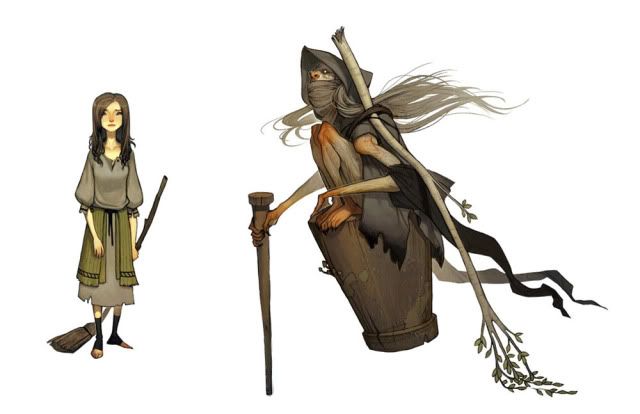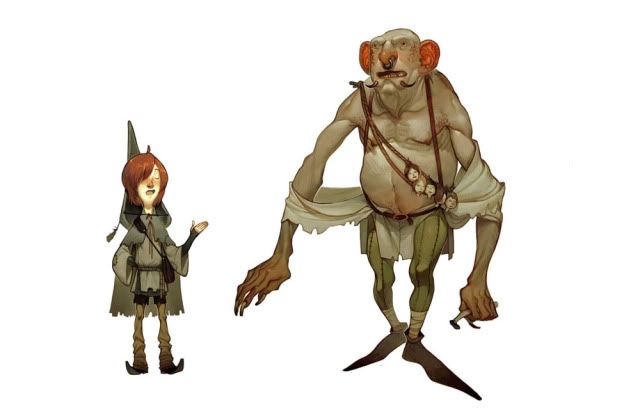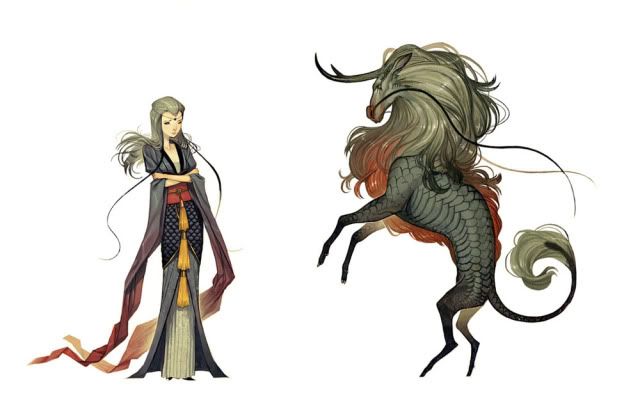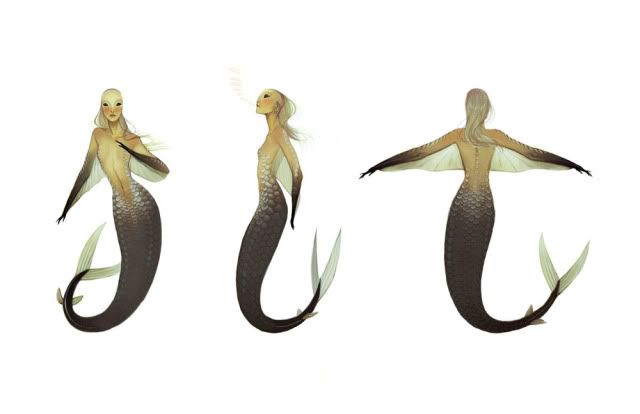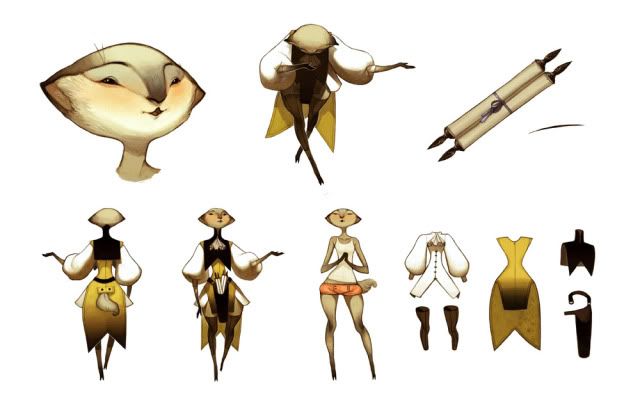Yeah, I think we do.Lago wrote:I think we have an idea for a new thread.
Black Forest is a game that is intended to take place in the fairytale world of Grimm's tales. Not some kind of Extra Adult version of that world, just the thing itself. As such, it is intentional that players be able to play Little Red Riding Hood or Alice as playable characters. But it also means that players should have access to characters like Prince Phillip and The Fearless Boy. That is, the game should be playable with characters playing at the level of curious children being confronted with goblins and wolves but still playable with characters riding around on horses with magic swords fighting dragons.
The method of doing this is by structuring things into a harshly leveled format structured into tiers. Levels are deliberately going to be unnamed in order to encourage people to begin play at the level that appeals to them narratively. While the intention is to play in Outside, Over There or The Lion, the Witch, and the Wardrobe where the players start as children who are scared and pursued by monsters but who grow as people and get access to badass magic and skills and end up hunting monsters for sport - but the game should be playable and enjoyable playing either extreme - making a single story arc that begins and ends with the main characters still bad ass monster hunters or traumatized children.
Black Forest Design Considerations
Step One: Name the PCs
To emphasize the fairy tale nature of the proceedings, the player characters are called "The Protagonists." This ensures that players are able to refer to characters like Hansel who are basically victims trying to sneak, run, and trick their way into surviving or characters like Parzival who are going out to hack up ogres with a sword.
Step Two: Write up a Six-Person Party
OK, there are two six person parties that we need to accommodate for a set of protagonists: one of them is a group of children, the other is a group of adventuring troubleshooters. In short, there needs to be a separate six player group for the Protagonists of a Brother's Grimm story and again for the Protagonists of The Brother's Grimm movie (by T. Gilliam).
- Curious Child - The character who is the nosiest and therefore good at gathering information. With abilities to get indulgent answers from adults and spot things that are out of place, contributions come as often by inspiring Antagonists into Bond villain monologues
- Goblin Pigkeeper - First of all, you're damn right people will want to play as goblins once they've been introduced. So it only makes sense to throw in some goblin standard characters. The pigkeeper has access to a lot of domestic skills and some good old fashion first aid. They can contribute to adventures by sewing up
- Goblin Ragpicker - the character who is the sneakiest. As a poor and filthy goblin recycler this character can be expected to be good at scouting and stealing, which are both sufficiently important that the character probably justifies his existence.
- Merchant's Kid - the character who can do math and knows how much things are worth. Invaluable to the team when confronted with exploitative offers from creepy strangers and able to contribute goods and advice when confronted with new people and places. Did I mention that he can do math?
- Seer - the character who is the creepy kid who can see and interact with magic in some way. This child can talk to animals or ghosts. His contributions are pretty random, but whenever there's magic around he should be able to add something.
- Shepherd - the character who has spent the longest time outside the village. Contributes with abilities like "knows what bears are" and "can eat wild berries."
- Assassin - Poison daggers, looks cool in black, and good at scaling into second story buildings. Contributes by backstabbing enemies and scouting. Think of him as a Goblin Ragpicker with a combat shtick.
- Minstrel - the character sings and dances, and gets flocks of rats to do what he wants. Also they can be extremely persuasive or just get people to dance themselves to death like they were in Moonwalker. Like a Curious Child with a combat shtick.
- Necromancer - the character has seven ghosts in a bag, can give inscrutable wisdom, and can peer inside things. Taxidermied boars fight enemies on his behalf. Like a seer with a combat shtick.
- Warlord - Tattered leather coat? Check. Sharp teeth? Check. Riding boar? Check. Huge spear? Absolutely. He's scary and he will stab you. Like a Goblin Pigkeeper with a combat shtick.
- Warrior Prince - He's got a horse and a sword. He wears armor and can woo fair maidens. Contributes by being taken seriously by nobles and also by stabbing things right in the face with a sword. Like a Merchant's Kid with a combat shtick.
- Woodsman - He's got an axe and a beard, and he can both track and kill wolves. He contributes with his ability to locate and murder the monstrous woodland animals, and also in his exploration talents. Like a Shepherd with a combat shtick.
Curious Child, Goblin Pigkeeper, Goblin Ragpicker - this party is going to want to sneak around a lot because 2 out of 3 children are sneaky. The pigkeeper is holding that aspect back, because they aren't much good except at being unobtrusive. On the flip side, the Curious Child could join in with the "getting captured and working in the kitchens" plan that the pigkeeper has while the rag picker goes full sneak mode. In general, you've got one scout, one spy, and one switch. So the Protagonists should be heavy into intrigue plots.
Shepherd, Merchant's Kid, Seer - three kinds of exposition gathering, these guys would expect to get banished from or otherwise lose their home town in the first episode because they all have ways of contributing directly to survival and plot advancement in "over there."
Assassin, Minstrel, Necromancer - good range of stealth, social, and information gathering abilities. Combat appears to involve dropping battlefield control effects while the assassin back stabs people stuck in mind prisons or dance dance revolutions.
Warlord, Warrior Prince, Woodsman - again, the second party is more exploration and less stealth oriented. But I still note that everyone seems to be contributing something and no one is going to be left behind.
Step Four: Write up an adventure
The Malediction strikes the local baron's castle, and the occupants turn into ghouls. Flesh eating monsters march to the village and drag everyone away to work on the baron's new project of digging down to uncover something the baron is now after (and also for noms). At this point, the Protagonists can either go to the castle and try to collect enough information to find the amulet themselves and smuggle it out for destruction or to run off into the woods and find the local goblin king to figure out how to get his aid against the fallen baron.
For group 1 of children, the move to make would probably be to go right for the castle ironically despite the fact that they have 2 goblins on staff. While the other group would probably be better off going to the Goblin King. I think it important to note that both groups have the ability to complete either task.
The adult squad can actually open up a third option: run in and start face stabbing.
Step 5: Write out a campaign
So the Protagonists begin the game with their village liquidated by the Ghoul Baron. Regardless of whether they get aid from the forest goblins or not, the characters end this initial adventure with no parents and no home. Given a set of clues to the location of some treasure that could buy them back into society, they wander off into the woods.
There follows a set Goldilocks style monsters of the week, where the player characters learn a series of life lessons and grow as people. Throughout, there will be a recurrent plot about the Malediction and Ghouls. the Players should collect a set of magic items. Probably 1 to 3 per player over this period of the game.
Victory in the first stage of the campaign involves defeating a giant, werewolf, or some similar heroic tier opponent and getting half of a kingdom as one of the protagonists gets married off to some set of royalty. During this period, the characters rapidly graduate to being full heroes who can fight enemy ghouls by cutting them down with swords and spells rather than running away and relying upon plot devices to save them.
Then the second stage begins where the players go back and settle scores with witches, ogres, and monsters that they had to run from earlier. Final showdown is with the BBEG who brought the Malediction in the first place, who is a Superheroic Tier Vampire Lord.
Step 6: Choose a Base System
vitm wrote:Out of curiosity, what system does everyone think we should use for this game?
The goals of the game system are:Roy wrote:You'd almost certainly have to make your own, as retrofitting is made of Fail.
- Must have a very resilient mini-game for running away, sneaking around, getting information out of people, and talking.
- Must also have a harshly scaled combat system that is interesting and survivable which gives massive and dynamic support to grabbing and carrying people around.
- Must provide a manner for characters to easily "level up" in the middle of the action, and to do so in a staggered fashion so that spotlights move around.
The real key is giving people a number of chase actions available, as well as the maneuverability and speed scores. The players won't be as fast as a lot of their enemies, so the rules have to get to dodging around trees and furniture right off. Character size also needs to matter a lot. Smaller characters are weaker, but they can also hide in more things and also have their speeds reduced by vegetation less.
The character advancement system is also going to be lifted entirely from the FFT thread. That means players will get a "class" - this class gives them various intrinsic important salient powers. Character advancement is that during any chapter each character is entitled to grow as a person - where they gain a minor ability. They get these minor abilities by choosing them off their class list when they would come in handy (after which they stick). The instant they get enough minor abilities they level up. So they might go from Apprentice Blacksmith to Advanced Apprentice Blacksmith. In general, this means that everyone will level up in the same chapter, though not at the same time during that chapter.
-Username17
